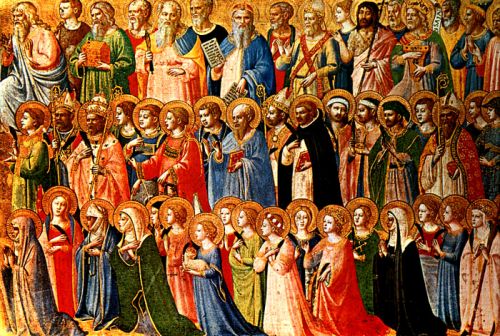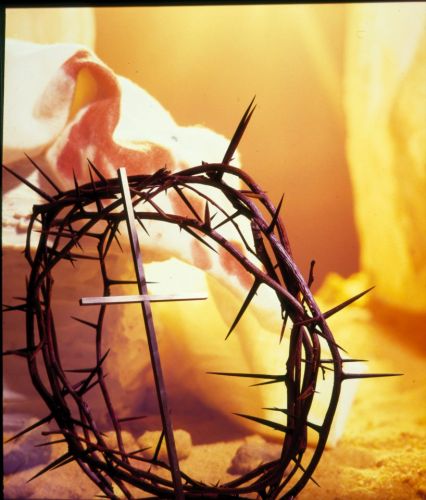Who Are The Practical Saints?A Story by Bishop R. Joseph Owles There seems to be a curious trend among Christians �" all Christians, Catholic and Protestant �" regarding sainthood. Catholics tends to reserve the term for those few, special individuals who appear to go above and beyond the demands of faith, while Protestants are often quick to remind others that every Christian is a saint in that all Christians have been sanctified �" made holy �" through Jesus Christ. The end result is that Catholics seem to jealously guard the mantle of sainthood, and since most Catholics will never live up to the standard they have imposed, most Catholics never strive to meet that standard. Protestants, one would think, since they claim to be saints already, would do better striving for that higher standard that most people envision when they hear the world “Saint”; yet, Protestants do not seem to emulate sainthood any better than the Catholics who decide they can never live up to the standards of sainthood. It seems where Protestants are concerned, if everyone is a saint, then no one is a saint. Another curious factor seems to be that if you were to tell a Catholic that you want to be a saint, the person you told would most likely respond with both bemusement and amusement. They are bemused at why anyone would want to try to live like a saint �" after all, sinning and confessing seems to be much more fun than not sinning at all �" and they are amused that you think you can live up to the standard of sainthood because they have engineered the standard in their own minds to mean “perfection.” So the Catholic response to an announcement of wanting to achieve sainthood is “Oh, you think you can be perfect, do you? Well you can’t! And even if you could be, why would you want to? But whatever. Good luck with that, I guess.” Protestants, on the other hand, seem to get genuinely offended when you tell them you want to be a saint. They are offended that you would want to be saint because it somehow seems to suggest to them that they are not saints, which they are, since all Christians are saints (even though most refuse to behave like saints). They will counter with “You want to be a saint? That’s arrogant and ambitious! Anyone who was a saint would not want to be a saint because a saint would be humble enough not to be a saint.”  First, saints are not perfect. The saints in the Bible are never perfect. Saint Peter is not only imperfect before the resurrection of Jesus Christ, he is imperfect after it as well. That imperfection apparently extended for more than a decade after Jesus was raised from the dead because Saint Paul, in his letter to the Galatians, says that he had to get in Peter’s face (that is what he says in the Greek) for acting like a hypocrite. So Saint Peter, who is often considered the head of the saints in Catholic circles, was never perfect. No other saint was perfect either. The reason why we tend to make people saints AFTER they die is because once a person dies, that person is not making any more mistakes, at least not on earth as we know it now. So being a saint is not about being perfect; yet if it were, it is about being perfect the way Jesus tells us to be perfect and not perfect according to impossible human requirements of perfection. A saint is just a sinner who gets back up when he falls. To be perfect, according to Jesus, is to treat all people the same, treating them the way you want to be treated, using what you have to help others, forgiving others when they wrong you, and being humble by being aware of your sins and acknowledging them. If a saint has any perfection, it is not that he does not sin, but that he does not justify, rationalize, or hide his sins; rather, he admits them freely and seeks forgiveness. Second, Protestants are correct in that all Christians are saints because all Christians are made holy by Jesus Christ. All Christians are sanctified, which means they are made holy. The point they miss, however, is that something is holy not because it is made out of special stuff or has some special mojo in it that makes it holy, something is holy because it is separated and distinguished from other like things. The Sabbath is holy because it is a day that was separated from other days. The Bible is holy because it is a book that is separated from other books. You can tear a Bible apart and no lighting will strike, and no random bad things will happen. Holiness is being singled out to be different. So if all Christians are saints because all Christians are made holy, then ALL Christians are called by God and singled out to be different from those who are not Christian. In a world in which Christians seem to live just like everybody else, it is hard to see where and how they are holy. Going to church, reading the Bible, believing in Jesus is not what makes a Christian holy; being different is what makes them holy. A parrot can be trained to quote the Bible, but it does not make the parrot holy any more than standing in a garage will make a person a car. Third, ambition and arrogance and politics run amok in the institution of the church in all its incarnations �" Protestant and Catholic. People seems to accept careerism on the part of clergy, ambitious church leaders who covet positions of power within the Church; yet, an ambition to become as saint is what offends people? One would think that if ambition were to be tolerated in the Church, it would be the ambition for sainthood rather than petty political power. It is neither pride, nor vanity, nor ambition that compels a person to strive for sainthood. It is love for Christ and acceptance of discipleship.  Even if the initial desire to reach sainthood were to begin with a desire for self-exaltation, that desire that first fueled the person would soon give way to a proper desire. Recovered Alcoholics, for instance, often begin working with others who suffer from alcoholism purely out of a desire to stay sober. They have learned that the best way to remain sober is to help another person get and stay sober. Yet, over time, many in recovery abandon the reason of self-preservation as their motive for helping others in favor of a different reason �" it feels good and makes them happy to help others. Later still, many who continue to help others abandon even that motive in favor of a new one �" they help others, not because it keeps them sober, and not because it feels good, but simply because that is who they have become. Sainthood is the same way. Whatever a person’s initial reasons are for seeking sainthood, if he follows through on that desire, even selfish and self-seeking desires will be corrected until being a saint is simply who that person has become. So even if someone at first seeks to become a saint because he feels that he is better than others, or that he may presently become better than others, or if he believes that once a saint, he will stand in a position of moral and spiritual superiority, then he will learn, sometimes quickly, sometimes slowly, sometimes with much distress, sometimes simply and with little effort, that superiority in any sense is absent from the life of a saint -- for if everyone is ultimately called to become a saint, then there can be no superiority because all are ultimately equal. Accepting the call to sainthood is accepting the call of Christ �" it is professing Christ before all people, not with one’s mouth, but with one’s whole life. It is an easy thing to confess Christ with the mouth; although, it is often pretended to be a sacrifice or a difficulty to do so. Jesus Christ declares that he will acknowledge before His Father in heaven and all the angels of heaven anyone who acknowledges Him before people. Christ is acknowledged before people when Christians live like Christians, confessing Christ with their lives, for even though our mouths may condemn us before God, it is our actions that save us �" not that anyone is saved by his own work, but by his work, he shows himself to be saved. Our mouths condemn us when our mouths confess Christ, but our lives confess something else. The Lord Himself says that there is surprise at the Last Judgment �" those who thought they were saved find themselves dammed, and those who thought themselves damned find themselves saved. How can this be? Because the Lord does not judge people according to what they say, but according to what they do (cf. Mt. 7:21). The Lord in essence says at the Last Judgment: “I don’t care that you call yourselves Christians, I only care that you live as Christians.”  Living as Christians is the essence of sainthood. A person is not a saint in his mind, or by his mouth, but sainthood consists of how he lives his life. He is not a saint by his words, but by his actions. If a person loves Jesus, then he will follow His commandments (Jn. 14:15; 14:21). Faith in Jesus and obeying God’s commandments is called “the endurance of the saints” (Rev. 14:21). It does not matter that Jesus lives in a person’s heart if Jesus does not also live in his hands, his actions, his thoughts, his eyes, his mind, his voice, in all that he is and does, so that Jesus Christ may be in all that he is, so that the confession of his mouth is supported and proven by the confession of his life. So if anyone is called to be a Christian, then he is also called to be a saint. Since sainthood, like love, is about doing, rather than being. The mistake most people make is waiting to feel like saints before they try to behave like saints. They believe that feeling precedes doing. Yet, if someone decides to behave like a saint, sooner or later, he will feel like a saint. People do not feel their way into acting, but act their way into feeling. So if growing into sainthood is synonymous with being Christian, and sainthood is a matter of doing, then Christians need a practical guide to living like saints. There is a lot of this in the Bible. There are clear cut statements and instructions on how to behave littered throughout the New Testament. Nevertheless, many people may require a still more practical guide that combs through the advice and expectations of the New Testament authors, and breaks it all down into very practical, clear-cut, definitive actions and behaviors. The information that follows is a guide to Practical Sainthood. Those who wish to follow the counsel offered within the following pages can call themselves the Order of the Practical Saints �" not the order of those who are practically saints. They are down to earth, pragmatic, people who find a tangible, concrete manner of living that reflects the Gospel and that confesses Jesus Christ in all that they do and say.  © 2013 Bishop R. Joseph Owles |
Stats
604 Views
Added on August 5, 2013 Last Updated on August 5, 2013 Tags: Bible, Jesus Christ, Church, saint, disciple, rule, God, heaven, earth, Holy Spirit, Christian, Protestant, Catholic, practical Author
|
|
|

 Flag Writing
Flag Writing